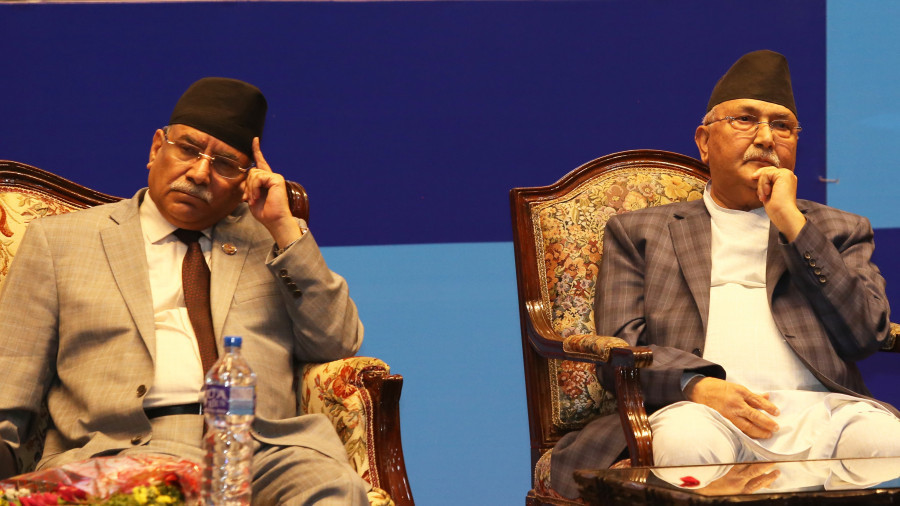Politics
In the ruling party, leaders’ focus has been on one-upmanship—not Covid-19
The party leadership squandered crucial months and multiple meetings bickering over their individual interests, ignoring the most pressing issues of the present time, insiders say.
Tika R Pradhan
For the ruling Nepal Communist Party and its government, the Covid-19 pandemic has largely been a non-issue. While the government’s response to the virus has been lacklustre, for the party, its internal dispute has remained more important than the disease that has so far claimed 336 lives in the country. The number of cases has already crossed the 50,000 mark.
The party on Friday declared that it has escaped a split. And in doing so, it took more than seven weeks—the crucial period during which coronavirus cases continued to rise.
“Though the Covid-19 issue was listed as the second agenda when the Standing Committee meeting started on June 24, it was rarely discussed in the 80 days, except on some rare occasions,” said Ganesh Sah, a Standing Committee member and former minister for science and technology. “There was a lack of seriousness as leaders were more focused on their individual interests.”
The intra-party conflict had a huge impact on governance. Since a faction in the party was demanding the resignation of KP Sharma Oli both as party chair and prime minister, he invested most of the time in bolstering his position. Since the faction led by the other chair Pushpa Kamal Dahal was using all its might in weakening Oli, governing leaders paid little attention to the pandemic and its impacts.
Leaders and former administrators had told the Post last month that in the system that Nepal practises, disputes in the ruling party take a toll on governance.
Even as the fight in the ruling party until Friday was said to be for the system and procedures, none of the leaders ever questioned the leadership on the situation the country has been facing due to the pandemic.
Even Friday’s Standing Committee meeting did not touch upon the Covid-19 issue.
The meeting ended with an understanding that Oli will focus on the government and Dahal will run the party as “executive chairman”.
On June 24, when the party held its Standing Committee meeting amid growing calls for Oli to resign, party spokesperson Narayan Kaji Shrestha said Covid-19 control, prevention and treatment was second on the seven-point agenda for discussion. The meeting did not discuss the issue.
On the second day of the meeting, on June 25, Secretariat member and Deputy Prime Minister Ishwar Pokhrel, who heads the Covid-19 Crisis Management Centre, refused to brief the leaders on the government’s response to the pandemic, citing a lack of preparations. Instead, the meeting discussed Nepal’s border issue, which became a major agenda for some time.
Soon after, Oli on June 28 accused the leaders of the rival factions of trying to hatch a plot to unseat him.
The meetings thereafter had a new agenda to discuss, and the pandemic was put on the back burner.
Many party leaders admit that the party wasted crucial months on unimportant issues.
“Had they focused on ways to combat the coronavirus, the government could have done a better job in the fight against the virus,” said a Central Committee member who spoke on condition of anonymity. “That could have saved both the party and the government from the scathing criticism.”
Leaving aside some casual remarks, party leaders have not even spoken about the corruption scandals which are tied with some ministers in the Oli Cabinet.
“A number of leaders who spoke on Friday had objected to the proposal by the two chairs that praised the government's response to Covid-19,” said Matrika Yadav, a Standing Committee member. “The government’s response needed an independent evaluation. The meeting should have discussed ways to combat the pandemic, but it, instead, tried to cover up the government’s failure and corruption charges.”
Party leaders and observers say the leadership spent the last 80 days to gain power and ensure their relevance rather than on discussing the people’s sufferings caused by the Covid-19 pandemic.
Dev Gurung, a Standing Committee member, admitted that the party had failed to pay attention to one of the most crucial agendas of the current times—the coronavirus.
“Everyone was focused on breaking the deadlock in the party,” Gurung told the Post. “On Friday, leaders stopped short of raising the issue strongly, as the prime minister was not present. He left soon after a brief speech.”
Now that the ruling party says it has ironed out the differences, some hope the pandemic would receive more attention from the party and the government. Amid rising number of cases and the government authorities’ confused response, Nepali social media users a couple of days back were protesting against the Oli government with the hashtag #StopDemocidePMOli.
Standing Committee member Raghuji Pant said the party and the government should have focused on the pandemic long ago, but they failed. “They must do it now,” Pant told the Post. “With the festival season approaching, Covid-19 needs greater attention. A strong response to the pandemic is required. Both the party and the government must make it a major agenda.”
According to Shrestha, the party spokesperson, Friday’s meeting took the government response to Covid-19 in a positive light and decided to make efforts to control the virus in a more effective way.
Political analysts say disputes and conflicts in any party are a given and that while resolving those issues, a responsible party must not ignore the issues of national importance.
“The failure to respond to the virus has led to the sufferings of more people,” said Shyam Shrestha, a political commentator who has followed Nepal’s leftist politics for decades. “The ruling party invested precious time in managing leaders’ ego instead of making plans for the immediate crisis. The ongoing pandemic is not a joke.”




 14.24°C Kathmandu
14.24°C Kathmandu














